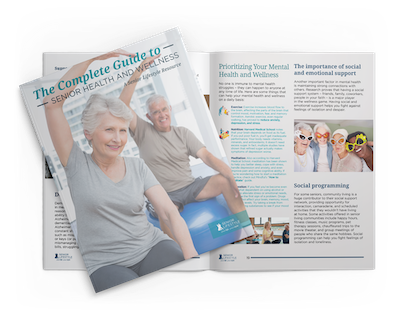Skin ages, despite how good you may have pampered it over the years. At some point after the pimple years, the blush of youth fades. One day your skin is smooth, tight and glowing, and seemingly the next, you may have signs of aging: Brown spots, lines, increased bruising, saginess and dryness. Skin changes affect men and women with age.
Good skin care for seniors is about a lot more than how it looks. It’s about skin health. Skin can reflect how you feel and mirror your good or bad health. There are good reasons for looking after your important outer self as you age. Here are some skin care tips for seniors.
What to Know About Your Skin
Skin is your protective outer layer that alerts you to conditions of hot, cold, pleasure, pressure and injury. It aids in:
- Regulating electrolyte and fluid balance
- Controlling body temperature
- Shielding you from the environment
The three primary layers of skin are:
- Epidermis – The Outer layer is composed of cells, pigments and proteins.
- Dermis – Nerves, oil glands, hair follicles and blood vessels make up the inner layer.
- Subcutaneous – The under layer comprises sweat glands, more hair follicles, fat and blood vessels.
Why Skin Changes as You Age
Skin changes are normal to aging skin and can be attributed to a combination of:
- Allergies
- Environmental conditions
- Genetics
- Nutrition
- Sun exposure
- Other factors, including smoking
Of these, sun exposure can be the most damaging to skin.
A National Institutes of Health study revealed that it’s important to have a full-body skin examination performed by a dermatologist when you are 70 and older.
Almost 80% of 552 adults examined had one or more skin diseases that necessitated treatment or medical follow up while more than a third had three or more ongoing skin diseases.

Download The Complete Guide to Health & Wellness for Seniors
As people grow older, their health and wellness needs change. Read our eBook, “The Complete Guide to Health & Wellness for Seniors” for everything you need to know about staying healthy and happy as we age.
Download the Guide4 Skin Issues You Should Watch For
There’s a variety of skin conditions that are commonly associated with aging. Here are a few and what you can do about them.
Sun Damage
You’ve probably noticed that your skin that has rarely seen the light of day has a more even skin tone and seems more supple than your skin that has weathered more sun exposure. Sun-exposed skin can become thicker, while overall your skin tends to thin as you age.
Skin pigments that give skin its color decrease with age. The ones that are left increase in size, according to MedlinePlus. Pigmented areas that have been exposed to sun are more susceptible to age spots and other problems.
Collagen and elastin fibers help keep skin flexible and resilient. The body’s production of these fibers declines with age. A lot of sun exposure can accelerate the loss of elasticity and lend a weathered look to skin.
You can’t reverse problems caused by sun exposure, but you can take steps to prevent further sun damage. While a little bit of sunlight is good for you, you should avoid getting too much. Try to adopt these practices, according to a National Institute on Aging report:
- Don’t sunbathe or use tanning beds and sunlamps
- Try to avoid sun exposure during peak sunny times, usually 10 a.m. to 4 p.m.
- Use a broad-spectrum sunscreen even when it’s cloudy
Check your overall body skin once a month for unusual changes to it that cause you concern. These can include new growths, bleeding moles and slow-healing sores. They could signal skin cancer, with sun as the main culprit. Seek the help of a skin specialist doctor if you’re concerned.
Slowed Wound Healing and Increased Bruising
Thinner, more fragile skin, smaller blood vessels and a decreasing skin fat layer can lead to more skin injuries in older adults.
Your skin doesn’t have the ability to heal as efficiently as it did during your younger years. Wounds can heal as much as four times slower than in the past. Bruising can also become more pronounced and occur as a large patch.
Wearing clothing that covers your extremities can help prevent further sun damage that can exacerbate skin problems, according to a report by The Journal of Clinical and Aesthetic Dermatology.
Bruising and skin injuries can be prevented by avoiding or padding sharp-edged furniture. Using gentle cleaning products and emollient creams daily can also help protect delicate skin from tearing.
Dry, Itching Skin
Rough, scaly and itchy skin can be caused by many things, according to NIA, including:
- Dry air
- Fewer sweat and oil glands associated with aging
- Frequent or hot showers or baths
- Inadequate fluid intake
- Sensitivity to some perfumes and soaps
- Smoking
- Some health problems, including kidney disease and diabetes
- Stress
- Sun exposure
The NIA recommends these tips to help avoid and improve dry skin:
- Apply moisturizing skin products daily or more as needed.
- Take fewer full baths and showers.
- Use warm, but not hot water.
- Use a humidifier in dry climates or dry seasons.
Bathing-Related Problems
Maybe you’ve never thought about the wonderful washability your skin has enjoyed through the years.
Think about all the so-called permanent inks, powerful glue formulas, dyes, stains, paints and other gunk your skin has encountered over the years. You probably don’t see a trace of any of these substances. It may be among the most washable substances on Earth.
Sweat and oil glands decline with age. You can keep your skin clean by fully bathing only two or three times a week, according to the NIA. Opt for sponge baths in between.
Harsh deodorant soaps may not be needed as often you age. Here are other steps you can take:
- Opt for milder soaps and cleansers
- Avoid products containing oils when bathing that can lead to an increased risk for slips and falls.
- Keep in mind that hot water is more drying to the skin than cooler water.
How to Take Care of Your Feet
The best skin care routine for seniors includes caring for the nails and skin on your feet. A 2019 study published in the Journal of Foot and Ankle Research found that older adults need more effective ways to support their foot self-care. Some of the participants considered their foot issues to be private matters and avoided seeking help.
Advancing age can make tending to toes and feet more difficult. The flexibility of youth stiffens. Increased weight can also deter people from caring for their feet. Nail thickening can also occur with age, making it more difficult to trim toenails. Study participants cited problems with tending to corns, calluses, dryer skin and ingrown nails.
- Ask family members for help with toenail trimming
- Don’t use sharp implements that can injure your skin and nail area
- Make an appointment with a foot care doctor
- Wash and dry feet well, especially between the toes
How to Make These Years Some of the Best in Your Life
Once only associated with senior housing communities, today the term “senior living” encompasses housing and a full range of products, services and activities that make the lives of senior adults more rewarding. Learn more about what Senior Lifestyle can do for you. Contact us today to find out more.

